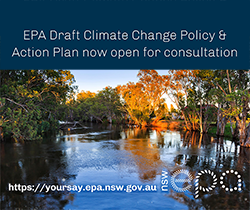Draft Climate Change Policy and Action Plan for comment
We know that a failure to act on the causes and contributors to climate change will have an impact on our everyday lives and communities in NSW.
 The EPA has a critical role in protecting the environment and community from the threat of climate change and in supporting the response by all levels of government, industry, and the community.
The EPA has a critical role in protecting the environment and community from the threat of climate change and in supporting the response by all levels of government, industry, and the community.
We are already acting on climate change, delivering major emission reduction initiatives under the NSW Waste and Sustainable Materials Strategy 2041 to support industries to reduce greenhouse gas emissions, aligned with the principles in the NSW Net Zero Plan.
We have released our draft Climate Change Policy and draft Action Plan for consultation and your feedback on our Have Your Say portal. We are seeking feedback from all our stakeholders including industry, business, government and community and we’ll be meeting with stakeholders over the next month to discuss the policy and action plan and hear their views.
NSW EPA Chief Executive Officer, Tony Chappel said over the past few years we have seen first-hand just how destructive the impacts of climate change can be not only on our environment but our NSW communities.
“We know the EPA has a critical role to play in meeting the NSW Government’s net-zero targets and responding to the increasing threat of climate change induced weather events.
“Climate change is an issue that we all face so it’s important that we take this journey together and all play our part in protecting our environment and communities for generations to come.”
Climate Change Action Plan
The Action Plan includes a range of new and continuing actions to:
- Inform & plan – such as requiring government and industry reporting, licensee management plans to develop best practice guidelines and tools to improve the evidence base, and support regulated industries to take proactive action to reduce emissions and build resilience to climate change risks
- Mitigate – including setting emission reduction targets, best-practice guidelines and emission limits to support regulated industries where required to cost-effectively reduce greenhouse gas emissions over time
- Adapt – such as implementing resilience programs, adaptation guidance, and harnessing citizen science to ensure the EPA, regulated industries and the community are more prepared for and resilient to climate change risks.
Climate Change Policy
The climate change policy landscape is complex and evolving and many of the EPA’s licensees are already forging ahead of mandated requirements. The EPA’s climate change actions will be staged, progressive and iterative – allowing time for licensees to adjust and for data to inform what actions must be taken and where.
The EPA’s staged approach is to:
- Listen and gather information – to understand the proactive work of industry leaders, evolving policies and global best practice
- Set targets and provide guidance – based on industry and expert feedback, alignment with other jurisdictions and the EPA’s own analysis
- Enable and require – industry to prepare climate change mitigation and adaptation plans based on evidence and best practice
- Require improved performance – progressively placing other requirements on licences.
Want to know more?
We are running information webinars. Go to the Have Your Say portal for details.

